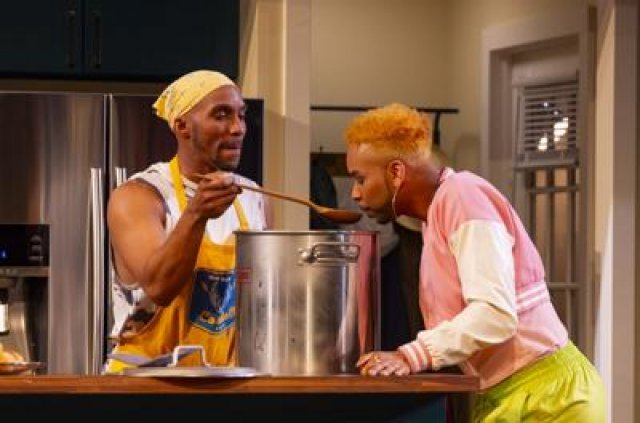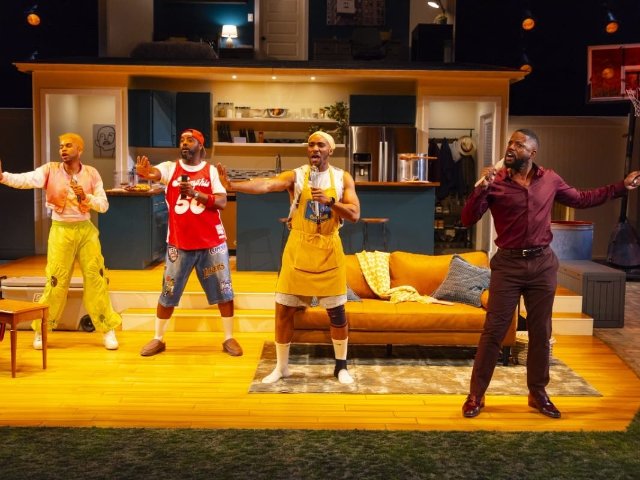The audience enthusiastically laughed while watching The Hot Wing King now at Hartford Stage through March 24. They also “aahed” at certain tender moments.
It is easy to see why this play won the Pulitzer Prize for Drama in 2021. The play is about family, friends and dreams. It is about the challenges we all face in navigating the potential pitfalls in families and the difficulties of new romantic relationships.
Too often, plays that try to explore all these subjects fail; in this case, the play truly explores these issues and others as well including the African American gay experience.
That this is an unconventional family didn’t matter in the least. The play’s main characters are Cordell who has moved to Memphis to be with his partner Dwayne and to try to win the annual hot wings competition. Cordell is not yet divorced and the move from St. Louis and the relatively new relationship is showing some strains. He has newly emerged from the closet. One of the strains is that Dwayne, a hotel executive, has difficulty with work-life balance. Another is he’s very involved with his nephew, TJ. He feels responsible for the teen and guilty that he may have caused his sister’s death at the hands of the police. And a third strain is that Cordell, a Georgetown graduate, hasn’t been able to find a job yet; he is uncomfortable with Dwayne paying all the bills.
The play opens with Cordell and two friends – the flamboyant Isom and the steadier Big Charles preparing for the big event the next day. The wings need to be cut, the marinade must be made, the cedar chips soaked, and more. Cordell is in charge, and he is fussy about how each thing is done. Though Dwayne has promised he will be there the whole weekend, once he arrives home, he is soon called back to the over-booked hotel because of a lost key. But at the same time, he mentions the possibility that TJ should live with them.
That is the basic setup of the play. My one complaint? Act one takes too long (75 minutes) to get the ancillary details established. We meet TJ’s father (Everett-EJ), a street hustler; we learn that TJ could easily follow in his footsteps. Isom complains about having to stir the marinade (counterclockwise) and more.
The much tighter act 2 (55 minutes), resolves all these issues in some unexpected ways. If it may seem a little too convenient, it still is satisfying to the audience. They like these characters.
The Hartford Stage production features an outstanding ensemble of acts. Each creates a very real person, and even with TJ and EJ we develop empathy for them. As Cordell and Dwayne, Bjorn DuPaty (Cordell) and Calvin M. Thompson (Dwayne), not only have real chemistry but each fleshes out the character. We can feel Cordell’s discomfort at his financial dependency and Dwayne’s divided loyalties.
Alphonso Walker, Jr. truly captures the conflicting emotions of TJ as a teenager wanting to seem independent, cool, and rebellious, but with a young boy needing guidance and affection underneath. As his father, Marcus Gladney, Jr. also shows us the hidden emotions of this father – defensive and realistic.
The two friends (Isom and Big Charles) are the least developed of the characters. We know very little about them; do we assume they are “a couple’? Israel Erron Ford plays the flamboyant Isom exactly that way, over-the-top, while Postell Pringle has less to work with playing Big Charles.
A highlight of the production has to be the realistic scenic design by Emmie Finckel. As you enter the theater, you see a suburban home – the kitchen, living room, upstairs bedroom, and side yard complete with a basketball hoop. It firmly establishes a middle-class neighborhood.
Director Christopher D. Betts has done a fine job of mining all the undercurrents of this play without letting it become preachy. She has balanced the pathos and the humor. When the audience gasped (or said “NO”) to one of Isom’s actions, it showed how involved they were with these characters.
Two Caveats: The language in this play contains words that some may find offensive. Some audience members may have difficulty understanding the dialogue due to the accents, speed of the conversation, and the slang used. I saw the show at the open captioned performance; the captions were very helpful through much of the first act until my ear adjusted.
For tickets visit HartfordStage.org


